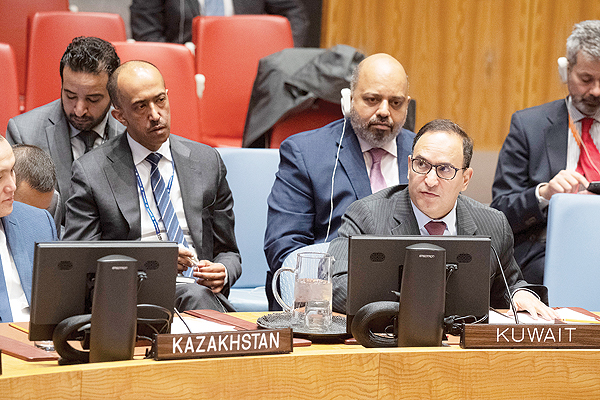Kuwait welcomes agreement between Yemeni parties in Sweden peace talks

NEW YORK/KUWAIT: Kuwait affirmed its support to resolve the crisis in Yemen through peaceful mediation efforts, especially if the United Nations is its facilitator. This came in the speech delivered by its Permanent Representative to the UN Ambassador Mansour Al-Otaibi during a Security Council session Friday to discuss the situation in Yemen.
Otaibi said that this stems from Kuwait's belief in the growing importance of this organization and its decisions taken by its various vital organs, especially the Security Council as the body responsible for maintaining international peace and security. He noted that in his belief that the solution to the crisis in Yemen is a political solution, Kuwait has provided a private plane that took the majority of the delegation from Sanaa to Sweden to participate in the last round of consultations.
The Ambassador expressed his hope that all Yemeni parties would invest their results and complete the steps outlined in them to reach a comprehensive agreement that will lead in its outcome to a halt to the catastrophic effects of the crisis facing Yemen. Otaibi affirmed that "the relative progress observed in this round of consultations is a great success if we take into account the circumstances of the crisis," adding that this progress "could not have been achieved only through the availability of the main factors represented by the unity of the Security Council towards the Yemeni file." He pointed out to the great role played by the countries of the coalition to support the legitimacy in overcoming all obstacles to the holding of that round.
Otaibi said, "although the round of Stockholm consultations did not come out with understandings on all the issues dealt with there, the agreement reached on the cities and ports of Hodeidah and the Declaration of Understanding on the city of Taiz will contribute to the difficult humanitarian impact of the Yemeni people. "The city of Hodeidah and its ports represented "an address for the aggravation of the difficult humanitarian impact. We see here that this agreement, specified in stages of implementation, will, in the event of its implementation, lead to a ceasefire and joint redeployment of forces to locations outside cities and ports," he added.
Otaibi stressed that the agreement would allow for a large margin of freedom of movement and safe access to humanitarian assistance and ensure that it is not subjected to obstruction or looting as was the case in the past. This will contribute to support the exchange rate of the national currency, which has seen a significant improvement in recent times, he added. On the other hand, Otaibi expressed hope that the understandings agreed upon by the Yemeni parties would end the negative effects of the siege imposed on Taiz city and prevent their inhabitants from facing the dangers of the humanitarian crisis. He also expressed his hope that the Yemeni parties would seriously commit themselves to the outcome of the Swedish consultations, which, if implemented, would be a key factor in alleviating the suffering of humanity and would translate the efforts of the international community and major donors in support of the humanitarian situation.
Last Thursday, UN Secretary-General Antonio Guterres said parties involved in Yemen reached an agreement regarding the exchange of more than 16,000 prisoners and another agreement on Hodeidah includes a cease-fire throughout the province and the withdrawal of all combat forces from the port. The parties involved also reached a mutual understanding to calm the situation in Taiz with the possibility of opening humanitarian corridors to allow the safe passage of goods and people across the front lines and reduce fighting in the province and the deployment of demining operations and the release and exchange of prisoners. The two sides agreed to form a joint committee headed by the UN to implement this and the committee is due to meet soon and agree on a plan for the establishment of interim peace in Taiz.
Important step
Kuwait has welcomed the agreement reached between Yemeni parties on several key issues at the conclusion of the week-long peace talks in Sweden. This agreement is considered an important and positive step to find a comprehensive solution to the ongoing conflict in Yemen, a source at Kuwait's Foreign Ministry said in a statement on Thursday. The deal is in line with the three references: The Gulf initiative and its executive mechanisms, the outcomes of the national dialogue and the UN Security Council Resolution 2216, the source stated. It underlined the importance of abiding by this deal in order to stop the bloodshed and ending suffering of the Yemeni people.
The source extolled the huge efforts, which were highly appreciated, by Sweden and the UN so as to reach such an accord. The conciliation talks in Sweden between the Yemeni parties concluded earlier in the day after agreeing on some key issues, mainly Hodeidah, Taiz and prisoners' swap. On Hodeidah, the agreement stipulates that Houthis withdraw from the ports of Hodeidah, al-Salif and Raas Issa toward north of Sanaa within 14 days, and the government redeploy its troops south. It stipulates also that Houthis withdraw fully from Hodeidah city in the second phase to sites outside their northern borders within 21 days.
The two sides further agreed on ceasefire in Hodeidah and its ports, enhance the UN efforts, commitment not to making any military reinforcement of both parties, opening corridors for humanitarian aid as well as deposit all revenues of the ports at the country's central bank. The talks had kicked off in an attempt to contain the crisis and reach a settlement through discussing building confidence and curbing violence and others. - KUNA










